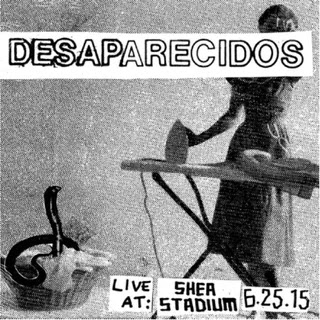This 2015 live set at the Brooklyn all-ages venue captures Conor Oberst’s reunited punk band digging into its scrappy, DIY roots.
Desaparecidos make scathingly political music, yet their most popular song is also their most positive song. In fact, says Conor Oberst while introducing “Mañana” toward the end of Desaparecidos’ new (but technically quite old) album, Live at Shea Stadium, “It’s the only positive song we’ve ever written.” “Mañana” is also the one song of theirs that could be accused of not aging particularly well. The recent 20th anniversary reissue of Read Music / Speak Spanish reanimated Oberst’s hellish visions of escalating gentrification and drone warfare, so what of the wonderfully idealistic and naive anthem that allowed for the possibility that things might actually get better? It’s worth noting that onstage in June 2015, Oberst does not dedicate “Mañana” to the recent protests against police brutality in Baltimore and Ferguson. He gives thanks to their “kindred spirits” in So So Glos, the scrappy and mostly apolitical Brooklyn punks that established the all-ages venue Shea Stadium and welcomed Desaparecidos into their orbit. This salutation makes for the most telling moment of Live at Shea Stadium—this is not a quasi-celebrity band doing an underplay but one that earnestly wants to give a DIY space in Brooklyn equal billing.
From the moment Oberst allowed himself to get roasted on his own album, he’s wrestled with the impostor syndrome that comes with his method-acting approach to art. Freewheelin’ truth teller, yeoman troubadour, inscrutable mystic—these were all pretty easy to square with his public persona. But being Desaparecidos’ frontman has always been the most difficult for him to pull off, even if there’s no doubting the sincerity of the hard-left ideology that animates most of their music. “Man and Wife, the Latter (Damaged Goods)” and “Greater Omaha” have accumulated no nuance since 2002, nor has “When the President Talks to God,” the 2005 Bright Eyes song most lyrically similar to Desaparecidos—but they’re as blunt as they needed to be, particularly at a time when Oberst was one of the few major indie acts willing to face blowback for opposing America’s post-9/11 jingoism. He gave a shout out to the Socialist Review on an otherwise drugged-out synth-pop album in 2005 and capped off a “Bright Eyes return to form” press cycle by interviewing with Jacobin Magazine.
Yet the mere fact of Being Conor Oberst in 2002 allowed Desaparecidos to mostly bypass dues-paying, “get-in-the-van” punk bona fides. They were able to complete one full tour for Read Music / Speak Spanish before the obligations of I’m Wide Awake, It’s Morning and Statistics and so forth resulted in their quiet disintegration. The Shea Stadium show documented here served as the release party for Payola and one of the few live dates Desaparecidos would honor in 2015, when the bulk were canceled as Oberst recovered from a battery of ailments. So from the moment they rip into “The Left Is Right,” Live at Shea Stadium fishes for the one compliment that short-lived, erratic punk bands hope to hear about themselves—you really had to be there.
Though Payola was in many ways the work of a tighter, more confident band, it lacked the urgency of its frantically composed predecessor, sounding like an album cobbled together over several years rather than a week—which it was. Throughout a well-balanced setlist, the beer-muscled energy of Live at Shea Stadium brings its source materials closer together in spirit; “The Left Is Right” and “Underground Man” are held together by a centrifugal force missing from their studio versions as well as, really, Oberst’s entire recorded output in the preceding 13 years. Aside from “Anonymous,” they jettison most of the time-stamped, topical, and theoretical material that made Payola feel somewhat quaint in 2015, when protests and police clashed in the streets as a literal matter of life or death. The looser approach also benefits Read Music, as “$$$$” stretches out to six minutes and imagines an alternate future where Desaparecidos got further into Sonic Youth rather than T.S.O.L. Conversely, any song that requires multiple pedals or a slower tempo or a solo falls apart immediately; one’s allegiance to the source material will ultimately determine whether “City on the Hill” sounds charming, or like a demo banged out by a band that, hungover the day after a gig, looks like what Oberst once called “hammered dog shit.”
It’s unlikely that anyone minded on that night—the crowd wasn’t a pack of revolutionaries in waiting, but a packed house of friends, VIPs, and well-wishers on a scorching June night in Brooklyn. Surely, some felt empowered by the fact that Oberst spat exponentially more venom at Joe Arpaio, the Pentagon, and the American healthcare system than he ever did at himself. Many more likely just pointed their beer towards the stage and tried to hoist up the wildly off-key whoas in “City on the Hill.” Live at Shea Stadium almost certainly isn’t meant to stoke anticipation for LP3 or reappraise the political valence of “The Underground Man” in the Joe Biden presidency. Instead, it’s a rare opportunity to avoid evaluating Desaparecidos’ political prescience and instead see them as they’d wanted to be seen: a scrappy punk band among many in 2015.



0 comments:
Post a Comment